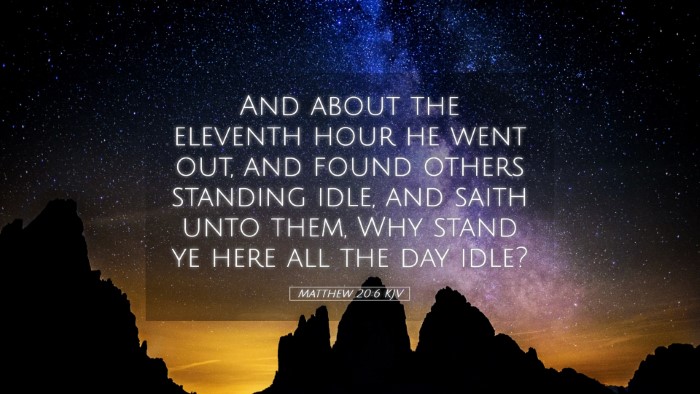Commentary on Matthew 20:6
Verse: "And about the eleventh hour he went out, and found others standing idle, and saith unto them, Why stand ye here all the day idle?"
Introduction
This verse is a part of the Parable of the Laborers in the Vineyard, where Jesus illustrates the nature of God's kingdom and His grace. In this parable, Jesus emphasizes the generosity of the landowner (representing Himself) and highlights the themes of labor, reward, and the unexpected distribution of grace. Matthew 20:6 serves as a critical moment in this narrative, inviting readers to delve into the significance of idleness and the divine inquiry posed to the laborers.
The Context of the Parable
The parable begins with the landowner hiring laborers early in the morning and agreeing to pay them a denarius for a day's work. As the day progresses, he hires more laborers at different hours, culminating with the eleventh hour workers. The distinctions made by the landowner regarding when the workers are hired set the stage for Jesus' teaching on the kingdom of heaven.
Key Themes
- The Divine Invitation: The landowner actively seeks more workers throughout the day, reflecting God's persistent call to humanity.
- Idleness: The question posed, "Why stand ye here all the day idle?" reveals the necessity of purpose and action in the Christian life.
- Grace: The seemingly unjust distribution of wages emphasizes God's sovereign grace and challenges human notions of fairness.
Insights from Commentators
Matthew Henry's Commentary
Matthew Henry notes the significance of the eleventh hour, suggesting it symbolizes God's mercy that extends to the very last moments of one’s life. The query about idleness serves as a reflection on the state of the soul; it encourages believers to examine their diligence in serving God. Henry emphasizes that it is not too late for anyone to respond to God’s call. The act of the landowner searching for laborers also symbolizes God’s active involvement in seeking out those who are in need of salvation.
Albert Barnes' Commentary
Albert Barnes elaborates on the implications of being idle, suggesting that it represents a state of spiritual inactivity. He states that the workers' idleness might be interpreted as neglecting opportunities for service and growth in faith. Barnes draws a parallel between the workers and Christians who are called to labor in the vineyard of the Lord. He further posits that the question implies accountability; believers must be engaged in fruitful work for the kingdom of God, lest they find themselves unproductive when the Lord returns.
Adam Clarke's Commentary
Adam Clarke emphasizes the theological implications of the landowner's question. His assessment of idleness leads to a profound understanding of God's grace. Clarke indicates that the latecomers represent those who may come to Christ later in life but equally receive salvation. He warns against the danger of spiritual complacency and encourages believers to be diligent workers, acknowledging that their place in God’s kingdom is not determined by when they come, but by their response to His call.
Theological Reflection
This verse compels us to reflect on our spiritual posture. Are we actively engaged in the work of God's kingdom? Are we vigilant and ready to respond to His call? The question posed by the landowner transcends the literal context and invites theological scrutiny concerning our roles as workers in the vineyard.
Implications for Pastors and Theologians
For pastors, this passage serves as a clarion call to encourage congregations to remain active in their Christian duties. The imagery of the vineyard can be interpreted to galvanize community service, evangelism, and discipleship. For theologians, the concept of grace illustrated here invites deep exploration of soteriology—the study of salvation and its implications for human response.
Conclusion
Matthew 20:6 not only presents a narrative of labor and reward but also offers a profound inquiry into the nature of our spiritual engagement. The themes of urgency, grace, and service are woven through this parable, reminding us that in God's kingdom, the call to work never ceases, and the opportunity to labor for Him is always available. As we reflect on this verse, let us emerge with renewed vigor to answer God's call and contribute to His vineyard with diligence and faithfulness.


